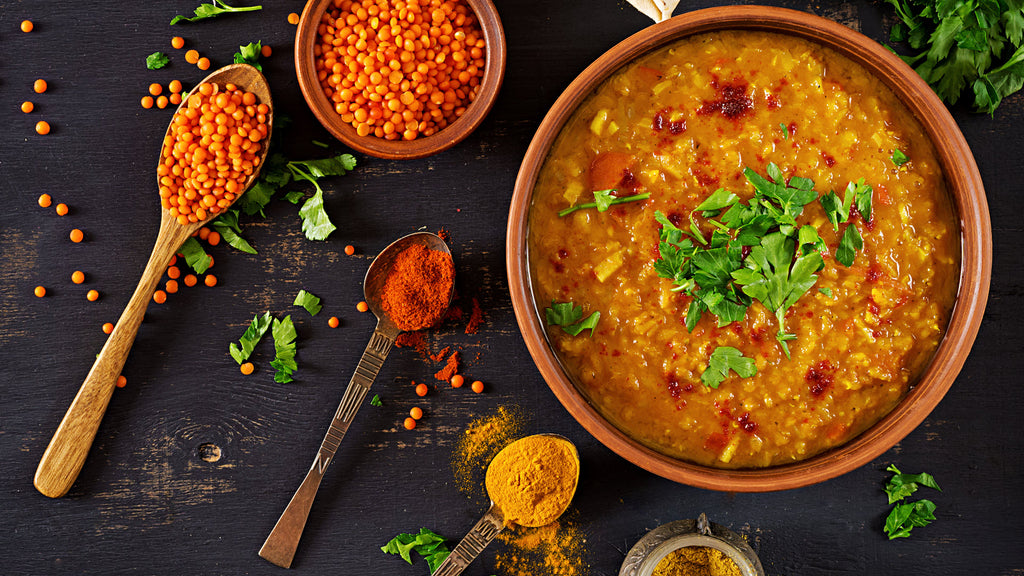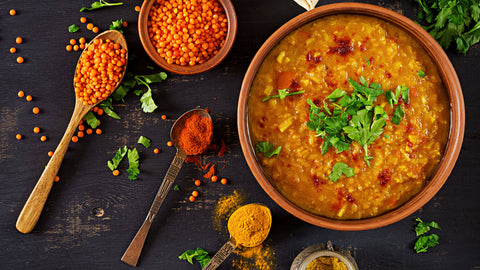
10 Ayurvedic Rules For Optimizing Your Digestive System

If you're suffering from digestive discomfort and you've tried every trick in the book, it might be a good time to change your perspective, and look at it through Ayurvedic Lens.
Ayurveda is an ancient healing science known to the Eastern philosophies for thousands and thousands of years. Literally translated as " The Science of Life," Ayurvedic healing principles have traveled to the West and are now incorporated in many familiar practices such as Homeopathy, Polarity Therapy, and even Traditional Chinese Medicine.
Many people may associate Ayurveda with yoga, its "sister discipline," since they both originated in India and their principles are completely intertwined. When explored together, these two practices complement each other and offer transformative tools that foster optimal health and vitality.
When it comes to digestion, Ayurveda teaches that many problems come from poor diet and eating habits, as well as specific lifestyle choices. Here are 10 Ayurvedic rules that can help you optimize your digestive system.

1. Chew Your Food
Sometimes, it's more important how you eat your food than what food choices you make. Chewing marks the start of your digestive process. It's when you start breaking down your food and increasing its surface area, stimulating the production of enzymes. Those enzymes will then turn your food into nutrient molecules your body can easily absorb.
When you don't chew your food properly, you're swallowing large chunks down your esophagus towards your acidic stomach, and missing out on all the nutrients your enzymes could extract. Once the food reaches your stomach, it's done, and the enzymes cannot efficiently do their work anymore.
Ayurveda promotes mindful chewing and eating practices, paying attention to every bite you take, and eating free from all distractions, so your food can reach porridge-like consistency before swallowing.
2. Avoid Stress-Eating
When our bodies are stressed, our nervous system is in fight-or-flight mode, and it's completely unable to activate the digestive system to do its work. That's why the other nervous system mode is called rest-and-digest, as that's when it's actually doing its best job.
When we're eating and digesting, all the blood goes towards the stomach and helps with nutrient extraction and absorption, as well as toxin filtering and secretion. That's why practicing mindful eating techniques is extremely important, as it prepares our nervous system for the Herculean task of breaking down food and properly distributing all nutrients where they should go.
3. Eat Regular, But Only When Hungry
When your hunger cues don't start knocking, don't eat just because you "have to." Wait until you start feeling peckish as that signals your brain your prior meal has fully digested. If that isn't the case, you'll be starting a new digestive process before you've even finished the last one. And your body can't digest food in two different places at the same time.
That means the food that's still in your stomach is waiting until new food comes in to be digested with it. This "waiting" can cause inflammation and digestive discomfort, as chemicals being released aren't supposed to be there.
That being said, try to keep a regular eating schedule, always around the same time. That way, your body will learn its feeding times and will know how to set the pace for digestion and absorption, and when to signal the bowels to start moving. It might need some time getting used to, but it's definitely worth it.
4. Eat Seasonal and Local Foods
Ayurveda teaches how local and seasonal foods are your best option at any given time, as fresh foods that have been ripened by the sun are rich with prana, also known as the "breath", or "life force." The foods that are harvested and then shipped from farther places and stored contain less prana, if any, and are therefore energetically less valuable.
Focus on what grows in your area and visit farmer's markets to educate yourself on what types of food grow in what season, and avoid imported and previously frozen fruit and vegetables.
5. Take a Walk After Meals
Sitting down after a meal is never a good idea as you're slowing down the digestion process. This can, in turn, cause bloating and other uncomfortable symptoms. Instead, take a short walk around your house or neighborhood. Even 10-20 minutes will do.
Make sure your walk is slow and easy, nothing too vigorous or tiring. You're simply helping your digestive system do its work more efficiently by stimulating movement in your stomach and in your bowels.
6. Drink Plenty Of Water Throughout The Day, Not With Meals
Avoid drinking a full glass of water while you're eating, as it slows down your digestion and fills your stomach with liquid. If you're feeling thirsty it probably means you're dehydrated and you need to work on your water intake before and after your meals.
Make sure to drink plenty of liquids throughout the day, starting with a glass of water as soon as you wake up and ending with a glass of water before you go to sleep. Depending on how active your lifestyle is, you might need more than the recommended 8-10 glasses of water a day, so pay attention to your own body's signals and drink up.
Proper hydration ensures every system in your body is running smoothly, so you're not only helping your digestive system, you're optimizing your hormone balance, blood sugar levels, skin hydration, brain function, and more.
7. Avoid Mindless Snacking
Do you feel like you're always grabbing something to snack on? When you're acting that way, you're not allowing your digestive system to rest. The moment a piece of food enters your mouth, your taste buds and your saliva start excreting enzymes and signaling to the stomach and the brain that digestion has begun.
If you're doing that every hour or so, you're never letting your digestive system take a breather and do its job properly; you're always just restarting it. Space out your meals so they're at least three to four hours apart, and give your body some time to chill.
8. Spice it Up
According to your dosha type, your digestive system may need some help from specific spices and herbs that can stimulate and control your digestive fire. Ginger, cinnamon, cardamom, fennel..those are all incredibly powerful spices that can help you when you're feeling bloated, fatigued, sluggish, and "heavy."
All three doshas are different, but they share some similar characteristics, and you might find yourself stuck in between two types. For example, you might be a small, thin frame (Vata), but have an intense appetite (Pitta), or sluggish and slow (Kapha), but energetic and nervous (Vata). Combinations are very common, so make sure to learn about both types and implement Ayurvedic eating principles. The only way to figure out what works for you is through trial and error.
9. Get Enough Sleep
Sleep is extremely important for our overall health and wellbeing, so it doesn't come as a surprise that adequate sleeping time and good sleeping habits are directly connected to our digestive system and its efficacy.
The rest-and-digest function of our nervous system peaks when we sleep, as that's when all of our systems go into repair and rebuild mode. Pay more attention to implementing a better night routine and eliminate all distractions from your bedroom, letting your body and mind reach complete zen.
10. Manage Stress
If only there was a button we could press and our stress would magically disappear. Until someone comes up with that innovation, we are left to figuring it out on our own. It's not easy and the way we tackle it definitely changes depending on the situation, but it isn't impossible.
Learning how to lower your stress response throughout the day will protect you on all fronts, from your immune to your digestive system. Implement different techniques like meditation, journaling, puzzle making, listening to relaxing music, or cooking, and find what calms you down.
Keeping our stress on the down-low ensures overall health and longevity as our bodies aren't constantly trying to fight or be prepared to fight an invisible enemy.
As you can see, Ayurvedic principles are more like guidelines to follow and adapt to your lifestyle than strict rules that need to be obliged no matter what. It's on you to figure out how to immerse them into your life and help your digestion improve.
This document has been edited with the instant web content composer. The online instant HTML editor tools make a great resource that will help you a lot in your work. Save this link or add it to your bookmarks.




































